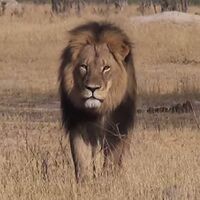Killing of Cecil the lion: Difference between revisions
(Created page with "Category:Influences on Morrissey - Other {{Page |WikipediaPageTitle=Killing_of_Cecil_the_lion }} {{PageDate}}") |
No edit summary |
||
| Line 1: | Line 1: | ||
[[Category:Influences on Morrissey - Other]] | [[Category:Influences on Morrissey - Other]] | ||
[[File:Cecil the lion.jpeg | 200px | right | thumb |Cecil the Lion]] | |||
{{Page | {{Page | ||
|WikipediaPageTitle=Killing_of_Cecil_the_lion | |WikipediaPageTitle=Killing_of_Cecil_the_lion | ||
}} | }} | ||
{{PageDate}} | {{PageDate}} | ||
Latest revision as of 14:56, 5 May 2023
Mentioned In
- Cecil the Lion - true-to-you.net (July 31, 2015)
- Thank you, New York City - true-to-you.net (August 4, 2015)
Wikipedia Information
 |
Cecil (c. 2002 – 2 July 2015) was a male African lion (Panthera leo leo) who lived primarily in the Hwange National Park in Matabeleland North, Zimbabwe. He was being studied and tracked by a research team of the University of Oxford as part of a long-term study. On the night of 1 July 2015, Cecil was lured out of the protected area and wounded with an arrow by Walter Palmer, an American recreational big-game trophy hunter, then tracked and killed with a compound bow the following morning, between 10 and 12 hours later. Cecil was 13 years old when killed. Palmer had purchased a hunting permit and was not charged legally with any crime; authorities in Zimbabwe have said he is still free to visit the country as a tourist, but not as a hunter. Two Zimbabweans (the hunting guide and the owner of the farm where the hunt took place) were briefly arrested but the charges were eventually dismissed by courts. The killing resulted in international media attention and caused outrage among animal conservationists, criticism by politicians and celebrities, and a strong negative response against Palmer. Five months after the killing of Cecil, the U.S. Fish and Wildlife Service added lions in India and West and Central Africa to the endangered species list, making it more difficult for United States citizens to kill lions legally on safaris. According to Wayne Pacelle, then President of the HSUS, Cecil had "changed the atmospherics on the issue of trophy hunting around the world", adding, "I think it gave less wiggle room to regulators." Because of the high level of media attention and the negative reporting about the killing of Cecil, significantly fewer hunters came to Zimbabwe in the months that followed. This led to the country suffering financial losses and a lion overpopulation in the Bubye Valley Conservancy.
